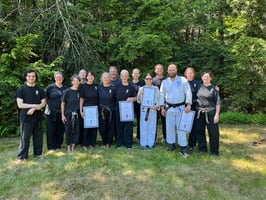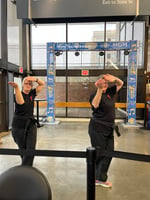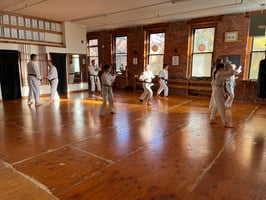Karate concepts in my life I think about karate a lot. Definitely more than 5 years ago when I...
Keeping an open mind
What is shoshin?
Remember when you started karate, and you felt like you had no idea what was going on? And then you learned more, got a new rank — and started learning a bunch of new things and once again had no idea what was happening?
That cycle is the reason why one of the most helpful qualities a practitioner can bring to their practice is shoshin. Usually translated as beginner’s mind, shoshin is an important Zen concept that means, briefly, having an open, eager attitude toward learning new things.
This can be a challenge, especially for adults. We’ve become experts in our jobs, our hobbies, our lives. Starting a karate practice means going back to a place where we are literally learning how to walk all over again. For some folks, that loss of expertise and control, with the possibility of feeling dumb or embarrassed, is scary and overwhelming. Encountering that feeling each time we learn a new kata can be a lot to handle.
Sensei Brooks and I once spoke about how a student’s capacity to be ok with that state of not knowing was vital to practice. I think this capacity is a better indicator of how rewarding a student will find their practice than any innate athletic ability.
Shoshin isn’t just about having a joyful attitude toward constantly learning new things. The longer you train, the more shoshin becomes about humility and about not being complacent in your expertise.
There’s always more to learn; even after we know all the kata in our style, we’re never done. We become better practitioners when we regularly challenge our assumptions about how a move can be applied, or how a technique should be understood. I once spent 6 months rebuilding my punch after I returned to hitting the makiwara after some time away, and realized my angle of approach wasn’t as good as I thought it was.
And knowledge doesn’t just come from the senior ranks. A less experienced student may have a fresh perspective you hadn’t considered. We all say “Please teach me” to each other, after all — it’s not just lower ranks bowing to the senior folks.
Having a shoshin mindset may not come naturally, but it is a mental skill we can cultivate along with our knowledge of physical karate techniques. It helps me to remember that going from confusion to clarity is a process that’s necessary for growth.
I also know that no one’s here to play “gotcha” with folks who are in the learning part of the cycle. As an instructor, I’m honored and excited to have the privilege of showing someone a new kata or a new aspect of a familiar technique, and I’m pretty sure my fellow instructors feel the same way.
Arigato!
***
A long time ago, I interviewed Sensei Brooks about the connection between our style of Karate and Zen. Although we didn’t refer to it by that name, we discussed the concept of shoshin during our conversation. You can read the discussion here: http://www.fightingarts.com/reading/article.php?id=341
And this comic offers a great take on how I try to approach teaching. If you’ve ever heard me say, “You’re lucky today” when I start you on a new kata, this is what I’m referring to.
https://xkcd.com/1053/



